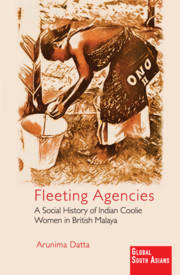Book contents
- Frontmatter
- Dedication
- Contents
- List of Tables
- List of Figures
- List of Abbreviations
- Acknowledgments
- Introduction
- 1 Coolie Women in the Empire’s Rubber Garden: Historical and Contextual Background
- 2 “Tapping” Resources: (Re)Figuring the Labor of Coolie Women on Estates
- 3 Managing “Partnerships”: Domesticity and Entrepreneurial Endeavors
- 4 Negotiating Intimacies and Moralities: Enticements, Desertions, Violence, and Gendered Trials
- 5 Becoming “Ranis”: Coolie Women as Rani Jhansi Regiment Recruits in World War II
- Conclusion
- Epilogue
- Glossary
- Notes
- Bibliography
- Index
Conclusion
Published online by Cambridge University Press: 31 December 2020
- Frontmatter
- Dedication
- Contents
- List of Tables
- List of Figures
- List of Abbreviations
- Acknowledgments
- Introduction
- 1 Coolie Women in the Empire’s Rubber Garden: Historical and Contextual Background
- 2 “Tapping” Resources: (Re)Figuring the Labor of Coolie Women on Estates
- 3 Managing “Partnerships”: Domesticity and Entrepreneurial Endeavors
- 4 Negotiating Intimacies and Moralities: Enticements, Desertions, Violence, and Gendered Trials
- 5 Becoming “Ranis”: Coolie Women as Rani Jhansi Regiment Recruits in World War II
- Conclusion
- Epilogue
- Glossary
- Notes
- Bibliography
- Index
Summary
The critical task of this book has been to consider the importance of the everyday experiences of migrant women laborers in national histories, transnational histories, and colonial migration histories. The work has shown that much of the scholarship on coolie communities has uncritically accepted stereotypes of coolies and of coolie women which have their origins in colonialism but were also propagated by elite nationalist opponents of British imperialism. This study has shown that real identities are more complex, situational, and changeable than such stereotypical categories suggest. Importantly, this work has shown, through the everyday histories of coolie women, that identities ranging from “innocent victim” or “abused worker” to “entrepreneur,” “moral Indian woman,” or “anti-imperialist soldier” could be strategically adopted as and when they were useful to improve an individual's situation and, in some cases, to ensure their survival. I have shown that the enaction of such identities involved complex and fluid forms of “agency” and, in so doing, I have sought to democratize understandings of agency in extremely oppressive situations. Furthermore, I have shown how re-evaluation of coolie women's history can help the rewriting and re-visioning of migration histories along with the histories of South Asia and Malaysia.
(RE)THINKING AGENCY
In thinking about agency in oppressive situations, this book has broadened the definition and understanding of the architecture and mechanics of agential acts, in order to make the definition of agency more inclusive. It has achieved this by accepting situational and fleeting actions, maneuvers, or strategies implemented by vulnerable and oppressed subjects as acts of agency in their own right. By analyzing coolie women's everyday encounters with colonial infrastructures of power, patriarchy, and gendered forms of Indian nationalism, I have demonstrated that in extreme situations of constraint and oppression, agency cannot be expressed in conventional ways; rather, the subjugated individuals perform their agential acts through modified acts of choice, preference, and self-determination, which may or may not appear as a pronounced and visible form of “free action.” Thus, in understanding the agency of subjugated individuals in such situations, we must modify conceptions of what count as agential acts to include the implicit, the covert, and the non-oppositional as well as open and defiant acts of resistance.
- Type
- Chapter
- Information
- Fleeting AgenciesA Social History of Indian Coolie Women in British Malaya, pp. 151 - 156Publisher: Cambridge University PressPrint publication year: 2021

